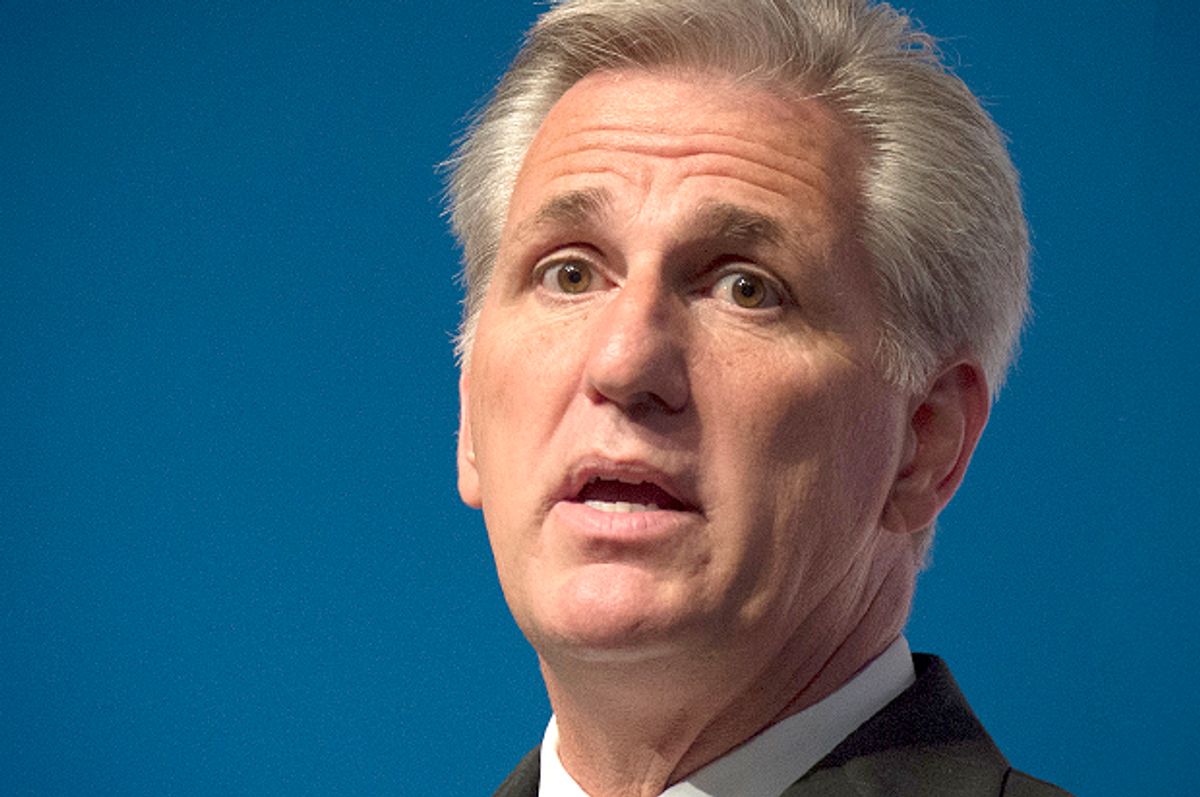Speaker-in-waiting Kevin McCarthy kicked himself in the teeth earlier this week when he went on national television and uttered a truth that was supposed to remain unspoken: the House Select Committee on Benghazi exists to damage Hillary Clinton’s presidential hopes. He appeared on Sean Hannity’s Fox News program and boasted that the committee’s work had damaged the previously “unbeatable” Clinton, and said that Republicans could expect more of the same under his speakership.
The comments drew intense blowback from Democrats and Republicans alike. The Democrats rightly took them as confirmation that the Benghazi committee is a politicized farce that uses taxpayer resources to achieve explicitly partisan goals. Republicans were mad at McCarthy for making it impossible to maintain any level of plausible deniability regarding the committee’s true purpose, and urgently demanded that he put the toothpaste back into the tube.
So McCarthy went back on Fox News last night to explain that he didn’t actually mean to say the thing that he said:
MCCARTHY: Well, this committee was set up for one sole purpose -- to find the truth on behalf of the families for four dead Americans. I did not intend to imply in any way that that work is political. Of course it is not. Look at the way they have carried themselves out.
BRET BAIER: But that's not what you said.
MCCARTHY: No, the point I was trying to make, and I want to be very clear about this, I wasn't saying the committee was -- that committee is solely to get the truth out. What happened within the truth, you found out about a server. This committee's sole purpose is to find the truth why four Americans were killed that night. And that's the work they have done. That's the hearings they have done. They've been applauded by all sides of the aisle. So it was never my intention do say that.
Not a single word of this explanation is true. The Benghazi committee was set up because none of the previous seven official investigations turned up any evidence that comported with the Republican allegation that President Obama and Hillary Clinton conspired to cover-up the “truth” about the attacks. What we know about the committee’s work obliterates the idea that its “sole purpose is to find the truth” about the deaths of four Americans in Benghazi. The committee has been subpoenaing and interviewing witnesses who are close to Hillary Clinton but have no knowledge of the attacks, and it’s been leaking information from those interviews to reporters.
As for McCarthy’s claim that he never intended to suggest that there’s a political angle to the Benghazi committee’s work, that argument might hold water if he’d only said it once. But he said the same thing several times, on television, where people saw it. “When we look at Hillary Clinton’s numbers today, America says they distrust her,” McCarthy said on "Fox & Friends." “Why? Because they found out the truth about her. And the only way they found out that truth about it was the Benghazi select committee.” On CNN he said much the same thing, offering the Benghazi committee as part of his strategy to “win the argument to win the vote.” His message – which he’d clearly crafted well in advance of this spate of interviews – was that select committee investigations are a great way to win political arguments.
Now he’s saying that’s not the case and falling back on the acceptable Republican framing of the Benghazi investigation as a solemn, fact-based inquiry into a tragic loss of American life. As Brian Beutler points out, McCarthy is already well over his skis in making promises to conservatives in the House that he can’t possibly keep. It’ll be interesting to see whether McCarthy’s colleagues feel they can rely on him to follow through on anything when they can’t even trust him to stay on message.

Shares